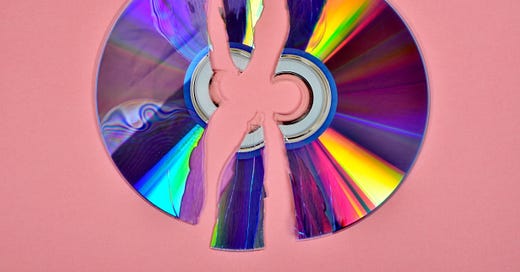The Culture Journalist is an independent journalism project that relies on word-of-mouth and is funded by listeners. If this podcast adds something meaningful to your day, please consider supporting this work by becoming a paid subscriber. You can also help us out by leaving a review on Apple podcasts, which allows more people to find us.
There are plenty of reasons to complain about music journalism these days.
If you're a music journalist, the shrinking career prospects and low wages are probably the first thing that come to mind—along with the feeling that it's becoming harder to land a pitch on an artist or developing news story if it doesn't seem destined to hit the algorithmic jackpot. If you're an artist or casual reader, you might feel, to borrow a phrase from writer Soraya Roberts, like the craft is "drowning" in a culture of sameness—endlessly litigating the fashion choices and 280-character utterances of the same handful of big pop stars at the expense of other voices and communities that need to be heard.
Or maybe you're of the mind that the writing itself leaves something to be desired. In an age of declining advertising revenue, prompting for-profit publications to cut back on headcount while prioritizing rapid-fire output and page views at all costs, this isn't necessarily writers' fault, but we can't say we always disagree. (Though seriously, if you’re looking for some gorgeous music writing, read New York Magazine critic and recent Pulitzer Prize finalist Craig Jenkins. Congrats Craig!)
Which brings us to the question we want to talk about on this week's episode: Has music journalism lost its way?
Earlier this week, the debate bubbled up on music Twitter after a user named @cllnsmith posted a viral joke about Pitchfork that (understandably) made a lot of people in the music journo community pretty mad. The timing, for our own opportunistic purposes, was perfect, because we happened to be putting the finishing touches on an episode with veteran music journalist and NPR music critic Ann Powers, inspired by a Facebook post she published that offered a refreshingly nuanced take on the forces beleaguering the field.
"Here's something I think music writers might want to think/talk about," she wrote. "The rise of the quick react/hot take colliding with the unmanageable proliferation of accessible music releases and streaming platforms' algorithmic favoritism of the very few have combined to enforce media focus on pop's 1 per cent to the extreme."
Noting the extent to which underground and mid-level artists appear to have been crowded out of the conversation, she raises a thought-provoking question: "Is this a correlation to the rise of the one per cent in other aspects of the culture?”
Lucky for us, Ann was kind enough to join us to talk about how we got here. And as someone who has been chronicling American pop music and youth culture on the ground for nearly four decades, from the scrappy alt weekly scene of 1980s of San Francisco to the august halls of the Los Angeles Times and The New York Times, she seemed like the perfect person to help us make sense of the shifting role of the music journalist, along with the economic, technological, and wider cultural forces that have shaped it.
There's no denying that a robust music press is crucial for the future of the industry and the artists trying to find their way within it. But it's hard to chart a path forward without getting clear on what it is we're losing when we lament music journalism's decline. What is the point of music journalism and criticism? Why did we need it in the first place? What remains—even in the era of streaming and social media—that makes it still important to have now?
Join Emilie and Andrea as we go long on these questions with Ann and compare notes on our respective journeys through the field.
Follow Ann on Twitter
Read Ann’s latest book, Good Booty: Love and Sex, Black and White, Body and Soul in American Music
Check out Turning the Tables, an ongoing NPR Music series Ann spearheaded dedicated to “refocusing the canon on stories and voices that have been overlooked, marginalized or hidden in plain sight”
Read Ann’s 50-year retrospective on Joni Mitchell’s Blue
Read Ann’s 2020 year-end essay, “Diary of a Fugue Year”
Listen to Ann talk about Prince on BBC Radio 4
Read more
“On flooding: Drowning the culture in sameness” (Soraya Roberts, Longreads)
“Can music journalism transcend its access problem?” (Jeremy Gordon, CJR)


















Share this post